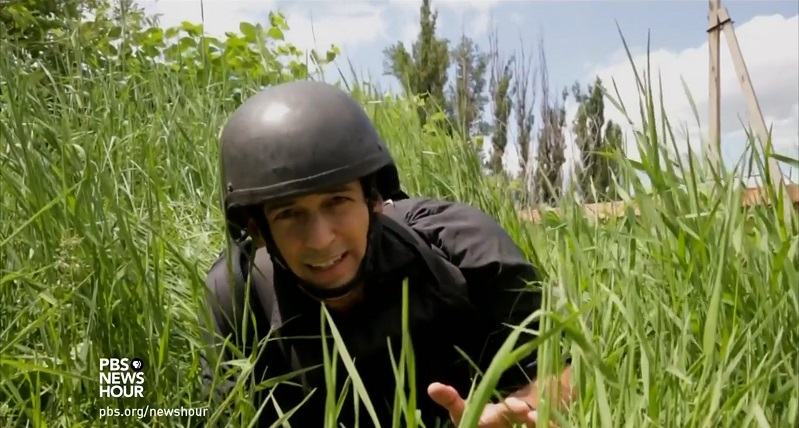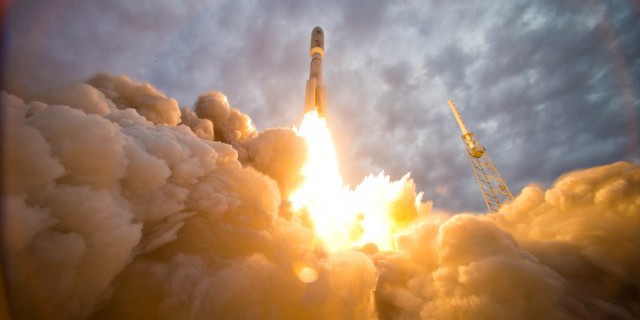Since April 2014, Russia had been waging a proxy war in eastern Ukraine. Although no war was officially declared, Russia’s covert and overt support was crucial in financing, equipping, providing personnel, and supplying intelligence to the pro-Russian separatists. Still, even with such support, pro-Russian separatist rebels proved unable to counter Ukraine’s military advances. As a result, Russia recently made the fateful decision to undertake a direct military invasion into southeastern Ukraine, turning what was previously only a proxy war into something undeniably real.
However, even with units of the Russian Army invading and occupying parts of eastern Ukraine, Russian President Vladimir Putin has repeatedly denied any Russian involvement, and cynically played himself off as being a peacemaker. Most recently, Vladimir Putin even had the audacity to suggest that the Ukrainian government in Kyiv needed to sit down and seriously discuss ‘statehood’ for the Russian occupied regions of eastern Ukraine. In reality, Russia’s illegal annexation of Crimea and current invasion of eastern Ukraine, illustrates that historical patterns of Russian imperialism never went away after the collapse of the Soviet Union.
Yet Russia’s actions in Ukraine appear to have come as a surprise to many policymakers, analysts, and media commentators in the West. Part of the problem is that many in the West were lulled into a false sense of security after the end of the Cold War, stemming from the widely accepted “triumph of liberalism” thesis popularized by Francis Fukuyama, where it was taken for granted that Russia and the other post-Communist states would transition into democracies and liberalized economies. As a result, many analysts and policy elites in the West generally failed to see the illiberal patterns of post-1991 transformation actually taking place in Russia. That assessment would have pointed to the coming of an increasingly authoritarian, atavistic, and re-assertive Russia.
The triumph of liberalism largely proved to be illusory and false, as Russia is far from being either a democracy or liberalized economy. But this has not been so much a reversal of reforms. Even a cursory glance at political patterns in Russia compared to the relative rates of transformation in leading liberal reform countries, such as the Baltic States, Czech Republic, and Poland would have revealed that Russia was actually a laggard in putting in place significant democratization and economic liberalization policies.
On democratization, Russia lagged behind when it came to comprehensive reforms to ensure the protection of individual rights, rule of law, and private property rights. These reforms would have all served as prime ingredients buttressing a stable democracy. Consequently, comparatively little change occurred during the crucial years of the 1990s. Instead, there was backsliding on most of the tentative reforms, and increasing reversion towards authoritarianism, as illustrated in Freedom House’s annual rankings.
While often overlooked by many Western analysts, Russian political culture simply lacks the historically rooted liberal-democratic traditions that often underpin democratic consolidation. Another problem has been Moscow’s increasingly firm control over the Russian media, which now promotes a stridently anti-democratic, anti-capitalist, and anti-Western message.
In terms of economic liberalization, evidence suggests that far-reaching reforms in Russia were marginal and not even halfway at best, particularly in Russia’s dubious attempts at privatization. Instead, many of the business practices from Soviet times continued to persist. This was especially apparent with Russian natural gas giant Gazprom, where the state has retained virtual control. Indeed, Gazprom has served as a key foreign policy tool used to promote Moscow’s interests in disputes with Ukraine, the Baltic States, and other European Union (EU) members.
Russia’s failure to democratize, and its reversion to authoritarianism, was also matched by historical continuities in foreign policy reminiscent of Soviet times. Although underreported and often ignored by Western media, this has been happening more and more since 1991. Throughout the 1990s, Moscow supported separatists in proxy wars in Transnistria in Moldova, and in Abkhazia and South Ossetia in Georgia. It also attempted to coerce and bully the governments of Estonia, Latvia, and Lithuania away from their desire to democratize and liberalize economically, which were key steps to return to Europe and move away from Russia.
To illustrate one specific example, Latvia repeatedly faced significant coercion from Russia, which included embargoes of trade, oil, and gas; delaying tactics in the closure of Russian military bases and troop withdrawals; stalling on ratifying border agreements; threats over the treatment of ethnic-Russians; and economic sanctions for not conceding privileged access to Russian oil and gas interests. Russian officials and media even resorted to baseless propaganda in calling Latvia fascist, in what can only be described as a rehearsal to the type of vitriolic propaganda being directed at the current government in Kyiv.
However, it was not until the Russian cyber attacks on Estonia in 2007, and the Russian invasion of Georgia in the summer of 2008, that many in the West began to wake up to Moscow’s revanchist behaviour – even if such attention proved to be short-lived. Sadly, it was not until Russia’s recent illegal annexation of Crimea, the tragedy of Malaysian Airlines flight MH17, and Moscow’s support of pro-Russian separatists in eastern Ukraine, that many Western leaders began to realize that Russian interests are increasingly out of sync with the commonly shared liberal-democratic values found among members of the EU and North Atlantic Treaty Organization (NATO).
In condemning Moscow’s aggression, the removal of Russia from the G8, and the exclusion of Russia from the upcoming NATO summit in September in Wales, are good symbolic gestures. However, with increasingly clear evidence of Russia’s direct support for pro-Russian separatists and invasion of Ukraine, it appears that current Western sanctions have done little to sway Moscow’s belligerent behaviour.
Instead of targeted sanctions, another step to get Moscow’s attention would be to extend sanctions more completely to the Russian oil and gas sector, which the Russian economy is dependent on for export revenue. Here, Russia is more vulnerable than the EU members that are heavy importers of Russian energy products. Certainly, alternative sources of oil and gas would need to be found, and increased production in Canada and the United States could help fill the long-term gap for Western Europe. Another key step would also be to cancel all current military weapons contracts with Russia including France’s Mistral-class ships.
Considering that pro-Russian separatists have been consistently well armed and equipped by their Russian benefactors, more military material and financial support is also required from the members of NATO, especially if this conflict stretches out into the long-term. Additionally, it’s also time for the EU and NATO to extend an invitation of eventual full membership to Ukrainians in a show of solidarity in support of liberal-democratic freedoms. Membership prospects would offer encouragement to the democratic leaders of Ukraine. They would have something tangible to offer the Ukrainian people that would justify added liberal reforms, both in terms of democratization and liberalizing the economy, which Ukraine badly needs.
When the prospects of NATO membership for Ukraine was last seriously discussed in 2008, many of the older EU and NATO members, particularly France and Germany, were overly concerned with not wanting to hurt Russia’s pride, in the naïve belief that this would help maintain stability in the region. However, this strategy appears to be a complete failure.
While some “realist” foreign policy analysts in the West, such as John Mearsheimer, blame Russia’s atavistic behaviour on the expansion of NATO and the EU, arguing that it is a Russian response to perceived threats from the West, such conclusions are false and give little domestic context to understanding the motives of President Vladimir Putin. This is because realists generally disregard important domestic determinants of Moscow’s behaviour, such as Russian political culture, which historically lacks liberal-democratic traditions, tends to have an overtly anti-Western and authoritarian bent, and contains large amounts of positive historical memories that are nostalgic towards the Soviet Union.
Such realist assertions are also morally problematic, because they ignore the desires of the Ukrainian people, especially in regards to wanting democratic freedoms and the rule of law, as well as not wanting to live under the threat of Russian domination. Indeed, what most seriously threatens Putin is not the relative military threat that NATO and the EU pose, but the fact that the expansion of these clubs into Eastern Europe has historically brought a general trend towards both democratization and economic liberalization. Such trends directly threaten the authoritarian order in Moscow. This is why Moscow is fighting so hard to keep Ukraine destabilized, because Putin views this as his best chance of keeping Ukraine from moving Westward.
Moscow’s invasion of eastern Ukraine is a prime example of an increasingly resurgent and atavistic Russia flexing its muscles, and should not be taken lightly. Any failure of EU and NATO members to act in a decisive and cohesive manner will surrender the initiative to an anti-democratic and authoritarian Russia, and will further appease President Putin’s imperialistic agenda.
This is a revised version of a piece that was first published in the SSR Resource Centre's The Hub blog of the Centre for Security Governance.





